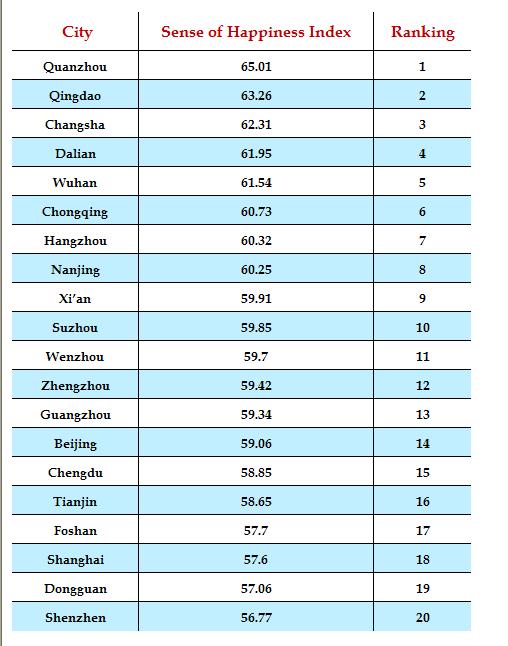Report: Migrant workers happiest in Quanzhou
- By Jiao Meng
 0 Comment(s)
0 Comment(s) Print
Print E-mail China.org.cn, May 14, 2012
E-mail China.org.cn, May 14, 2012
 |
The first survey on the sense of happiness of China's migrant workers revealed that they are the happiest working in Quanzhou,southeast China's Fujian Province.
China's migrant workers continue to score low on the sense of happiness index according to a recent survey conducted ahead of Labor Day in May. Ranked by city, the list shows Quanzhou to have workers who are most happy, while Shenzhen came in last.
The 2012 Report of Migrant Workers' Living Conditions in China was based on a survey by Renmin University's Department of Psychology and Gzhong.cn, an online recruitment website targeting China's blue collar workers.
The report found that migrant workers' sense of happiness was mainly affected by their basic personal survivability factors such as safety and health conditions, less by their relationships with others and the least by factors contributing to their socioeconomic status such as job opportunities and education level.
First overall on the sense of happiness index for migrant workers, Quanzhou specifically ranks first in the category of surveyed cities' living, working and studying accommodations that contribute to workers' comfort levels. It ranks second in migrant workers' job opportunities and their education levels, and third in the city's ability to meet basic survival needs of low level workers.
Xiang Lin, a volunteer psychological consultant in Shenzhen, said he believed people in Shenzhen, ranking last on the list, feel less happy mainly because it was a city with a large number of nonpermanent residents and a fast paced culture. "High pressure and the lack of a sense of security influenced the happiness index," he explained. "Most of the migrant workers are young people who are faced with huge pressure from work, marriage and family."
Li Jiuxin from the research center of Gzhong.cn said the new generation migrant workers have different characteristics and demands than their parents. Most born after 1990, these migrant works grew up with better living conditions provided by their parents who earned higher incomes from the cities. They are no longer satisfied by meeting their basic survival needs as their parents were, and they pursue leisure and better job opportunities in order to settle down in cities. In their pursuit, the new generation migrant workers suffer from a gap between their original social relations and new, unmet expectations, which contribute to low ratings on their happiness.
Started from last August, the survey used random samples from over 5 million registered users on Gzhong.cn and collected 2,473 effective questionnaires by telephone survey in 20 major cities. It was the first survey that studies Chinese migrant workers' survival experiences.
The study measured the workers' sense of happiness based on seven categories: basic survival, comfort level, social relations, family relation, development potential, working and studying conditions and social status.
Quanzhou, in Fujian Province, was once the largest port city in China, known as the origin of the "maritime Silk Road."






Go to Forum >>0 Comment(s)